小学英语一般现在时讲解及练习
- 格式:docx
- 大小:280.43 KB
- 文档页数:8
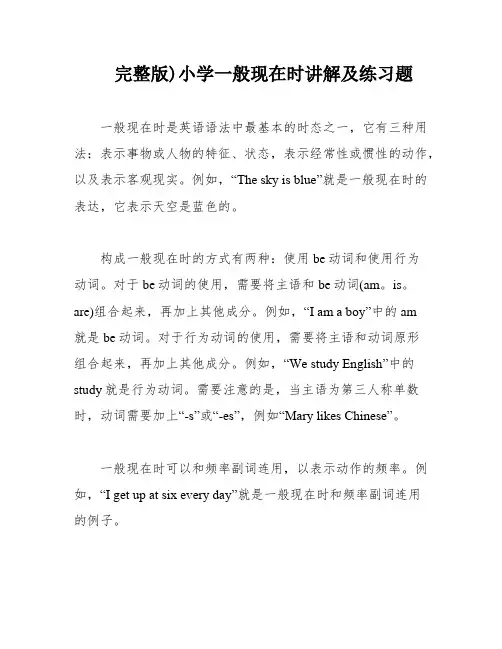
完整版)小学一般现在时讲解及练习题一般现在时是英语语法中最基本的时态之一,它有三种用法:表示事物或人物的特征、状态,表示经常性或惯性的动作,以及表示客观现实。
例如,“The sky is blue”就是一般现在时的表达,它表示天空是蓝色的。
构成一般现在时的方式有两种:使用be动词和使用行为动词。
对于be动词的使用,需要将主语和be动词(am。
is。
are)组合起来,再加上其他成分。
例如,“I am a boy”中的am就是be动词。
对于行为动词的使用,需要将主语和动词原形组合起来,再加上其他成分。
例如,“We study English”中的study就是行为动词。
需要注意的是,当主语为第三人称单数时,动词需要加上“-s”或“-es”,例如“Mary likes Chinese”。
一般现在时可以和频率副词连用,以表示动作的频率。
例如,“I get up at six every day”就是一般现在时和频率副词连用的例子。
一般现在时还可以用于构成否定句、一般疑问句和特殊疑问句。
对于be动词的否定句,需要在be动词后面加上not。
例如,“He is not a worker”就是be动词的否定句。
对于行为动词的否定句,需要在主语和动词原形之间加上don't或doesn't。
例如,“I don't like bread”和“He doesn't often play”就是行为动词的否定句。
对于一般疑问句,需要将be动词或do/does放在主语前面。
例如,“Are you a student?”就是一般疑问句。
对于特殊疑问句,需要在疑问词后面加上一般疑问句。
例如,“Where is my bike?”就是特殊疑问句。
需要注意的是,当主语为第三人称单数时,否定句和一般疑问句需要用doesn't,而不是don't或do。
例如,“He doesn't often play”和“Does she go to work by bike?”就是主语为第三人称单数时的否定句和一般疑问句。
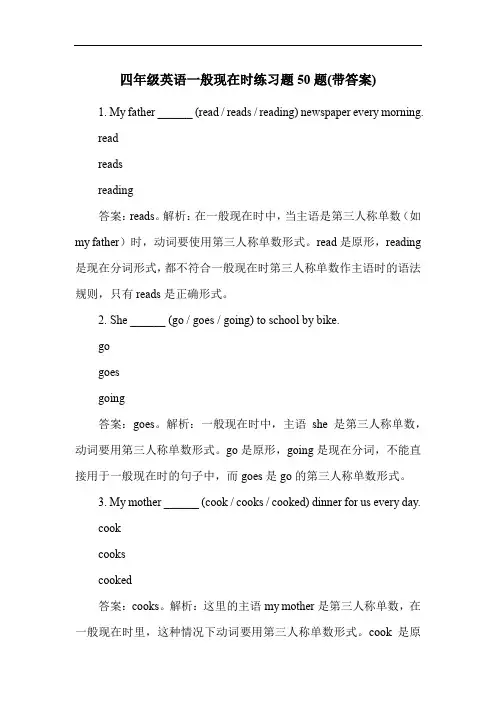
四年级英语一般现在时练习题50题(带答案)1. My father ______ (read / reads / reading) newspaper every morning.readreadsreading答案:reads。
解析:在一般现在时中,当主语是第三人称单数( 如my father)时,动词要使用第三人称单数形式。
read是原形,reading 是现在分词形式,都不符合一般现在时第三人称单数作主语时的语法规则,只有reads是正确形式。
2. She ______ (go / goes / going) to school by bike.gogoesgoing答案:goes。
解析:一般现在时中,主语she是第三人称单数,动词要用第三人称单数形式。
go是原形,going是现在分词,不能直接用于一般现在时的句子中,而goes是go的第三人称单数形式。
3. My mother ______ (cook / cooks / cooked) dinner for us every day.cookcookscooked答案:cooks。
解析:这里的主语my mother是第三人称单数,在一般现在时里,这种情况下动词要用第三人称单数形式。
cook是原形,cooked是过去式,不符合句子的时态要求,cooks才是正确的。
4. He ______ (play / plays / played) football on Sundays.playplaysplayed答案:plays。
解析:因为主语he是第三人称单数,一般现在时中,第三人称单数作主语时动词要变为相应的第三人称单数形式。
play是原形,played是过去式,不符合句子时态,plays才对。
5. My sister ______ (like / likes / liked) singing very much.likelikesliked答案:likes。
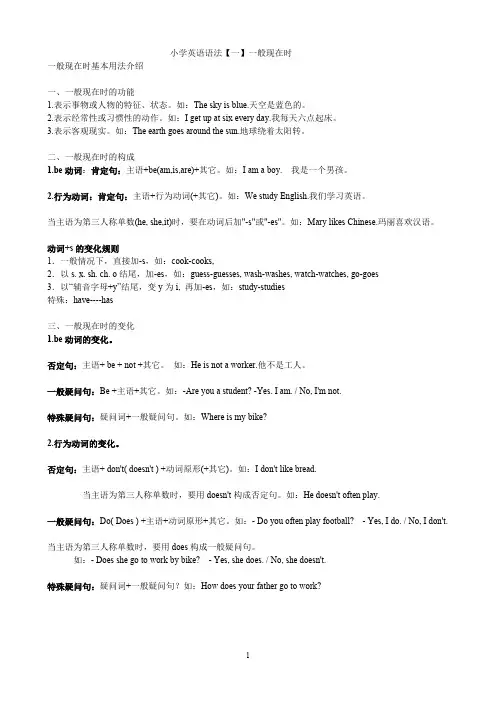
小学英语语法【一】一般现在时一般现在时基本用法介绍一、一般现在时的功能1.表示事物或人物的特征、状态。
如:The sky is blue.天空是蓝色的。
2.表示经常性或习惯性的动作。
如:I get up at six every day.我每天六点起床。
3.表示客观现实。
如:The earth goes around the sun.地球绕着太阳转。
二、一般现在时的构成1.be动词:肯定句:主语+be(am,is,are)+其它。
如:I am a boy. 我是一个男孩。
2.行为动词:肯定句:主语+行为动词(+其它)。
如:We study English.我们学习英语。
当主语为第三人称单数(he, she,it)时,要在动词后加"-s"或"-es"。
如:Mary likes Chinese.玛丽喜欢汉语。
动词+s的变化规则1.一般情况下,直接加-s,如:cook-cooks,2.以s. x. sh. ch. o结尾,加-es,如:guess-guesses, wash-washes, watch-watches, go-goes3.以“辅音字母+y”结尾,变y为i, 再加-es,如:study-studies特殊:have----has三、一般现在时的变化1.be动词的变化。
否定句:主语+ be + not +其它。
如:He is not a worker.他不是工人。
一般疑问句:Be +主语+其它。
如:-Are you a student? -Yes. I am. / No, I'm not.特殊疑问句:疑问词+一般疑问句。
如:Where is my bike?2.行为动词的变化。
否定句:主语+ don't( doesn't ) +动词原形(+其它)。
如:I don't like bread. 当主语为第三人称单数时,要用doesn't构成否定句。
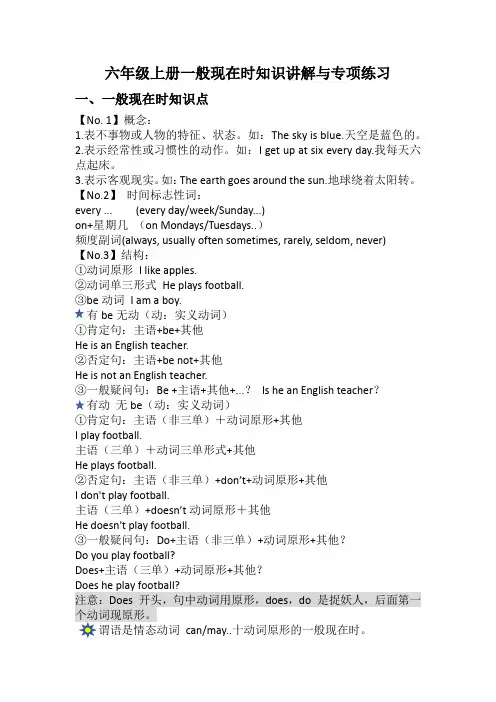
六年级上册一般现在时知识讲解与专项练习一、一般现在时知识点【No. 1】概念:1.表不事物或人物的特征、状态。
如:The sky is blue.天空是蓝色的。
2.表示经常性或习惯性的动作。
如:I get up at six every day.我每天六点起床。
3.表示客观现实。
如:The earth goes around the sun.地球绕着太阳转。
【No.2】时间标志性词:every ... (every day/week/Sunday...)on+星期几(on Mondays/Tuesdays..)频度副词(always, usually often sometimes, rarely, seldom, never)【No.3】结构:①动词原形I like apples.②动词单三形式He plays football.③be动词I am a boy.有be无动(动:实义动词)①肯定句:主语+be+其他He is an English teacher.②否定句:主语+be not+其他He is not an English teacher.③一般疑问句:Be +主语+其他+...?Is he an English teacher?有动无be(动:实义动词)①肯定句:主语(非三单)+动词原形+其他I play football.主语(三单)+动词三单形式+其他He plays football.②否定句:主语(非三单)+don’t+动词原形+其他I don't play football.主语(三单)+doesn’t动词原形+其他He doesn't play football.③一般疑问句:Do+主语(非三单)+动词原形+其他?Do you play football?Does+主语(三单)+动词原形+其他?①肯定形式:主语十情态动词can/may+动词原形+宾语。
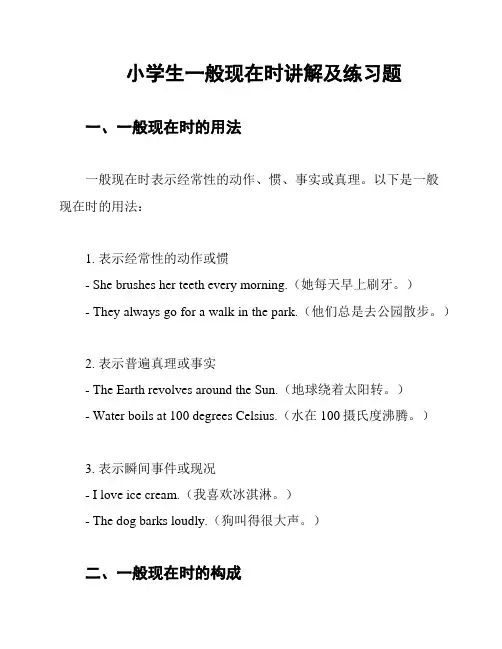
小学生一般现在时讲解及练习题一、一般现在时的用法一般现在时表示经常性的动作、惯、事实或真理。
以下是一般现在时的用法:1. 表示经常性的动作或惯- She brushes her teeth every morning.(她每天早上刷牙。
)- They always go for a walk in the park.(他们总是去公园散步。
)2. 表示普遍真理或事实- The Earth revolves around the Sun.(地球绕着太阳转。
)- Water boils at 100 degrees Celsius.(水在100摄氏度沸腾。
)3. 表示瞬间事件或现况- I love ice cream.(我喜欢冰淇淋。
)- The dog barks loudly.(狗叫得很大声。
)二、一般现在时的构成在一般现在时中,动词的变化相对简单。
1. 对于第三人称单数(He/She/It),动词要加-s或-es。
- He walks to school every day.(他每天走路去学校。
)- She eats an apple.(她吃一个苹果。
)- It runs fast.(它跑得很快。
)2. 对于其他人称(I/You/We/They),动词不变。
- I play soccer on weekends.(我周末踢足球。
)- You read books every night.(你每晚读书。
)- We go swimming in summer.(我们夏天去游泳。
)- They watch movies together.(他们一起看电影。
)三、练题请根据句意填入正确的动词形式。
1. My mother __________ (cook) dinner for us every evening.2. Tom and Lisa __________ (play) tennis on Saturdays.3. The sun __________ (rise) in the east.4. We __________ (study) English at school.5. Dogs __________ (bark) when they see strangers.1. cooks2. play3. rises4. study5. bark希望以上讲解和练习题对你有帮助!。
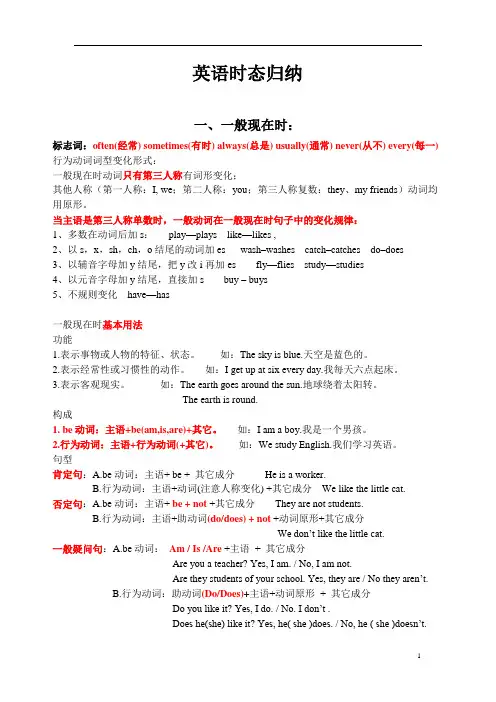
英语时态归纳一、一般现在时:标志词:often(经常) sometimes(有时) always(总是) usually(通常) never(从不) every(每一)行为动词词型变化形式:一般现在时动词只有第三人称有词形变化;其他人称(第一人称:I, we;第二人称:you;第三人称复数:they、my friends)动词均用原形。
当主语是第三人称单数时,一般动词在一般现在时句子中的变化规律:1、多数在动词后加s:play—plays like—likes ,2、以s,x,sh,ch,o结尾的动词加es wash–washes catch–catches do–does3、以辅音字母加y结尾,把y改i再加es fly—flies study—studies4、以元音字母加y结尾,直接加s buy – buys5、不规则变化have—has一般现在时基本用法功能1.表示事物或人物的特征、状态。
如:The sky is blue.天空是蓝色的。
2.表示经常性或习惯性的动作。
如:I get up at six every day.我每天六点起床。
3.表示客观现实。
如:The earth goes around the sun.地球绕着太阳转。
The earth is round.构成1. be动词:主语+be(am,is,are)+其它。
如:I am a boy.我是一个男孩。
2.行为动词:主语+行为动词(+其它)。
如:We study English.我们学习英语。
句型肯定句:A.be动词:主语+ be + 其它成分He is a worker.B.行为动词:主语+动词(注意人称变化) +其它成分We like the little cat.否定句:A.be动词:主语+ be + not+其它成分They are not students.B.行为动词:主语+助动词(do/does) + not+动词原形+其它成分We don’t like the little cat.一般疑问句:A.be动词:Am / Is /Are +主语+ 其它成分Are you a teacher? Yes, I am. / No, I am not.Are they students of your school. Yes, they are / No they aren’t.B.行为动词:助动词(Do/Does)+主语+动词原形+ 其它成分Do you like it? Yes, I do. / No. I don’t .Does he(she) like it? Yes, he( she )does. / No, he ( she )doesn’t.特殊疑问句:疑问词+ 一般疑问句A.be动词:How many students are there in your school?B.行为动词:What do you usually do on Sunday?一般现在时动词be和have的变化形式1.动词Be 叫连系动词, 用法:第一人称单数用am,第三人称单数用is,其它人称用are。
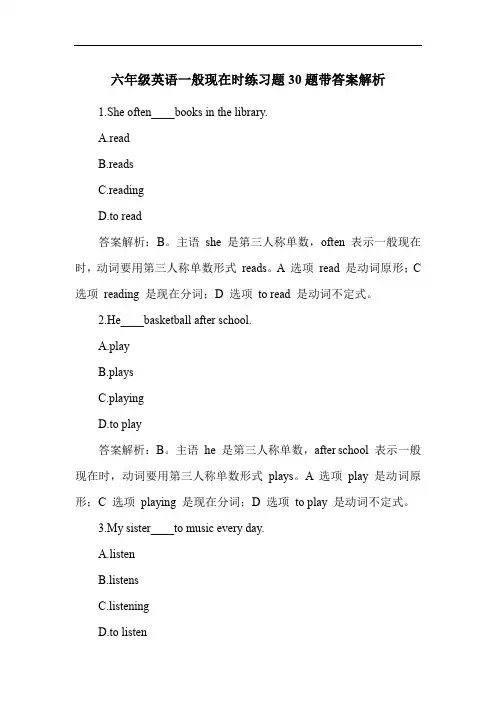
六年级英语一般现在时练习题30题带答案解析1.She often____books in the library.A.readB.readsC.readingD.to read答案解析:B。
主语she 是第三人称单数,often 表示一般现在时,动词要用第三人称单数形式reads。
A 选项read 是动词原形;C 选项reading 是现在分词;D 选项to read 是动词不定式。
2.He____basketball after school.A.playB.playsC.playingD.to play答案解析:B。
主语he 是第三人称单数,after school 表示一般现在时,动词要用第三人称单数形式plays。
A 选项play 是动词原形;C 选项playing 是现在分词;D 选项to play 是动词不定式。
3.My sister____to music every day.A.listenB.listensC.listeningD.to listen答案解析:B。
主语my sister 是第三人称单数,every day 表示一般现在时,动词要用第三人称单数形式listens。
A 选项listen 是动词原形;C 选项listening 是现在分词;D 选项to listen 是动词不定式。
4.The boy____his homework carefully.A.doB.doesC.doingD.to do答案解析:B。
主语the boy 是第三人称单数,carefully 不影响时态,一般现在时动词要用第三人称单数形式does。
A 选项do 是动词原形;C 选项doing 是现在分词;D 选项to do 是动词不定式。
5.Tom____up early in the morning.A.getB.getsC.gettingD.to get答案解析:B。
主语Tom 是第三人称单数,in the morning 表示一般现在时,动词要用第三人称单数形式gets。
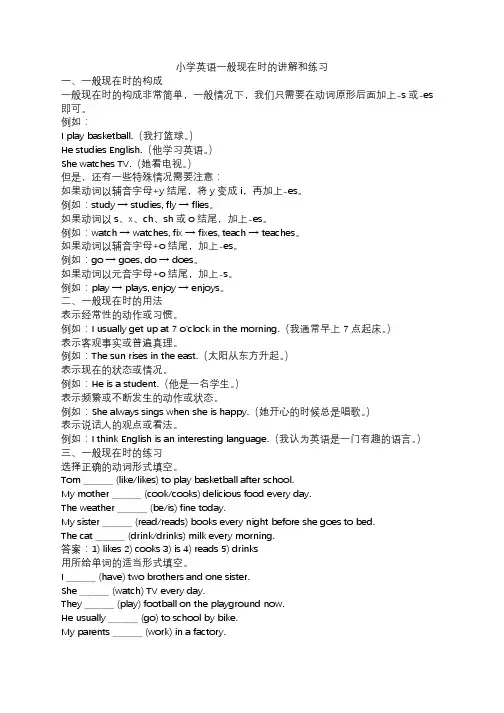
小学英语一般现在时的讲解和练习一、一般现在时的构成一般现在时的构成非常简单,一般情况下,我们只需要在动词原形后面加上-s或-es 即可。
例如:I play basketball.(我打篮球。
)He studies English.(他学习英语。
)She watches TV.(她看电视。
)但是,还有一些特殊情况需要注意:如果动词以辅音字母+y结尾,将y变成i,再加上-es。
例如:study → studies, fly → flies。
如果动词以s、x、ch、sh或o结尾,加上-es。
例如:watch → watches, fix → fixes, teach → teaches。
如果动词以辅音字母+o结尾,加上-es。
例如:go → goes, do → does。
如果动词以元音字母+o结尾,加上-s。
例如:play → plays, enjoy → enjoys。
二、一般现在时的用法表示经常性的动作或习惯。
例如:I usually get up at 7 o'clock in the morning.(我通常早上7点起床。
)表示客观事实或普遍真理。
例如:The sun rises in the east.(太阳从东方升起。
)表示现在的状态或情况。
例如:He is a student.(他是一名学生。
)表示频繁或不断发生的动作或状态。
例如:She always sings when she is happy.(她开心的时候总是唱歌。
)表示说话人的观点或看法。
例如:I think English is an interesting language.(我认为英语是一门有趣的语言。
)三、一般现在时的练习选择正确的动词形式填空。
Tom _______ (like/likes) to play basketball after school.My mother _______ (cook/cooks) delicious food every day.The weather _______ (be/is) fine today.My sister _______ (read/reads) books every night before she goes to bed.The cat _______ (drink/drinks) milk every morning.答案:1) likes 2) cooks 3) is 4) reads 5) drinks用所给单词的适当形式填空。
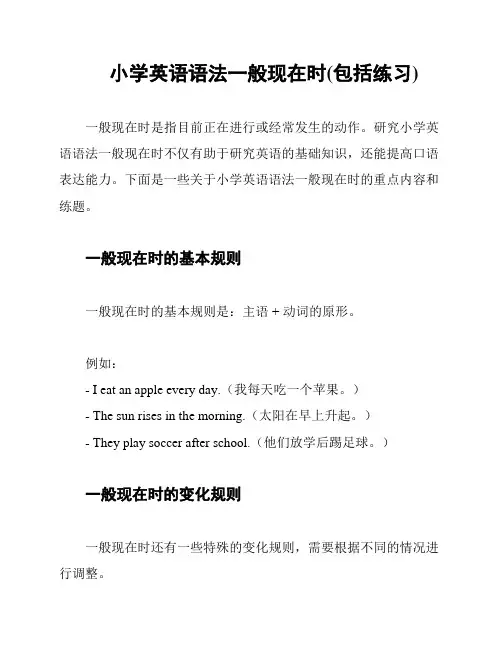
小学英语语法一般现在时(包括练习)一般现在时是指目前正在进行或经常发生的动作。
研究小学英语语法一般现在时不仅有助于研究英语的基础知识,还能提高口语表达能力。
下面是一些关于小学英语语法一般现在时的重点内容和练题。
一般现在时的基本规则一般现在时的基本规则是:主语 + 动词的原形。
例如:- I eat an apple every day.(我每天吃一个苹果。
)- The sun rises in the morning.(太阳在早上升起。
)- They play soccer after school.(他们放学后踢足球。
)一般现在时的变化规则一般现在时还有一些特殊的变化规则,需要根据不同的情况进行调整。
1. 当主语是第三人称单数(he,she,it)时,动词要加上-s或-es。
例如:- He eats breakfast every morning.(他每天早上吃早餐。
)- She works in a hospital.(她在医院工作。
)- The bird sings in the tree.(鸟儿在树上唱歌。
)2. 当动词以辅音字母+y结尾时,变成第三人称单数形式时,要将y变成i,再加上-es。
例如:- I study English.(我研究英语。
)- He studies English.(他研究英语。
)3. 当动词以“sh”,“ch”,“s”,“x”,“o”结尾时,变成第三人称单数形式时,要在动词后面加上-es。
例如:- She washes her hands.(她洗手。
)- He teaches math.(他教数学。
)练题1. 用适当的动词形式填空。
- My brother __________ (play) basketball every week.- The cat __________ (sleep) on the chair.- Lucy __________ (go) to school by bus.2. 将下列句子改成第三人称单数形式。
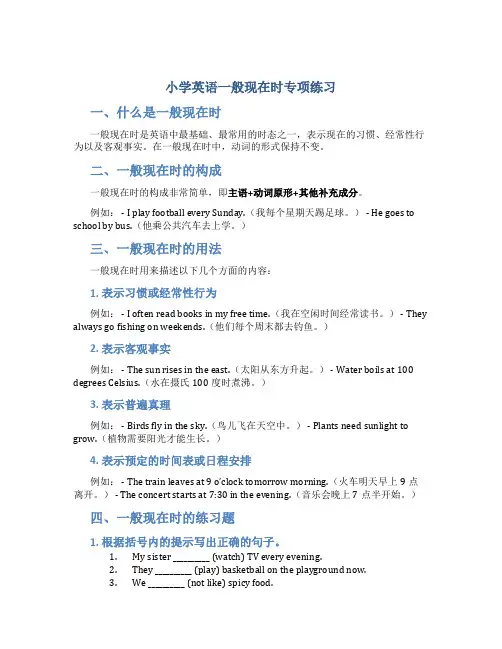
小学英语一般现在时专项练习一、什么是一般现在时一般现在时是英语中最基础、最常用的时态之一,表示现在的习惯、经常性行为以及客观事实。
在一般现在时中,动词的形式保持不变。
二、一般现在时的构成一般现在时的构成非常简单,即主语+动词原形+其他补充成分。
例如: - I play football every Sunday.(我每个星期天踢足球。
) - He goes to school by bus.(他乘公共汽车去上学。
)三、一般现在时的用法一般现在时用来描述以下几个方面的内容:1. 表示习惯或经常性行为例如: - I often read books in my free time.(我在空闲时间经常读书。
) - They always go fishing on weekends.(他们每个周末都去钓鱼。
)2. 表示客观事实例如: - The sun rises in the east.(太阳从东方升起。
) - Water boils at 100 degrees Celsius.(水在摄氏100度时煮沸。
)3. 表示普遍真理例如: - Birds fly in the sky.(鸟儿飞在天空中。
) - Plants need sunlight to grow.(植物需要阳光才能生长。
)4. 表示预定的时间表或日程安排例如: - The train leaves at 9 o’clock tomorrow morning.(火车明天早上9点离开。
) - The concert starts at 7:30 in the evening.(音乐会晚上7点半开始。
)四、一般现在时的练习题1. 根据括号内的提示写出正确的句子。
1.My sister __________ (watch) TV every evening.2.They __________ (play) basketball on the playground now.3.We __________ (not like) spicy food.4.The dog __________ (bark) loudly at strangers.5.She __________ (do) her homework after school every day. 2. 选择适当的词填空,完成下列句子。
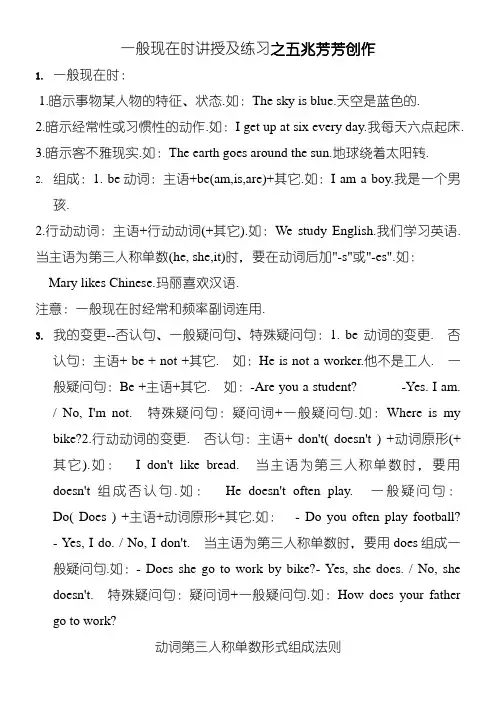
一般现在时讲授及练习之五兆芳芳创作1.一般现在时:1.暗示事物某人物的特征、状态.如:The sky is blue.天空是蓝色的.2.暗示经常性或习惯性的动作.如:I get up at six every day.我每天六点起床.3.暗示客不雅现实.如:The earth goes around the sun.地球绕着太阳转.2.组成:1. be动词:主语+be(am,is,are)+其它.如:I am a boy.我是一个男孩.2.行动动词:主语+行动动词(+其它).如:We study English.我们学习英语.当主语为第三人称单数(he, she,it)时,要在动词后加"-s"或"-es".如:Mary likes Chinese.玛丽喜欢汉语.注意:一般现在时经常和频率副词连用.3.我的变更--否认句、一般疑问句、特殊疑问句:1. be动词的变更.否认句:主语+ be + not +其它.如:He is not a worker.他不是工人.一般疑问句:Be +主语+其它.如:-Are you a student? -Yes. I am./ No, I'm not.特殊疑问句:疑问词+一般疑问句.如:Where is my bike?2.行动动词的变更.否认句:主语+ don't( doesn't ) +动词原形(+其它).如:I don't like bread.当主语为第三人称单数时,要用doesn't组成否认句.如:He doesn't often play.一般疑问句:Do( Does ) +主语+动词原形+其它.如:- Do you often play football?- Yes, I do. / No, I don't.当主语为第三人称单数时,要用does组成一般疑问句.如:- Does she go to work by bike?- Yes, she does. / No, she doesn't.特殊疑问句:疑问词+一般疑问句.如:How does your father go to work?动词第三人称单数形式组成法则动词原形变第三人称单数的法则与发音纪律同名词单数变单数大致相同,请认真不雅察.1、大多数动词在词尾加“S”在清子音后发音为[s],在浊子音及元音后发音为[z].如:①stop-stops [s] make-makes [s] ②read-reads [z] play-plays [z]2、以子音字母加“y”结尾的,要先将“y”变成“i”,然后在加“es”读[iz] 如:fly-flies [z] carry-carries [z] study-studies [z] worry-worries3、以“s, x, ch, sh”结尾的,在词尾加“es”,发音为[iz] 如: teach-teaches [iz] watch-watches [iz]4、以“o”结尾的动词,加“es”,读[z] 如:go-goes [z]do-does [z下面几个动词变成单数时,原词的元音部分的发音产生了较大的变更,请注意记忆. 如: 1)、do [du:]-does [dz]2)、say [sei]-says [sez] 以不发音字母“e”结尾的开音节词,如果尾音是[s],[z]时,加“s”后字母“e” 发音,与所加“s”一起读做[iz]. 如: close-closes[iz]be动词包含:am,is,are.第三人称单数用is;过来式为was;单数are,过来式为were.have,遇到主语是第三人称单数时,要用 has;动词 be 的第三人称单一般现在时练习题(一)写出下列动词的第三人称单数形式:drink--___________ go-- _____________ stay-- ____________ make--___________ look--__________ carry--___________ come-- ___________ watch--___________ plant--_____________ fly --_____________do--______________sit--______________guess--_____________die--______________go--______________rush-- __________reach--_____________touch--_____________brush--____________fly-- _____________copy-- ____________say-- _____________run--______________do-- ______________fix-- _____________live--______________cry--______________enjoy--_____________have--_____________wish--_____________play--_____________ teach-- ___________buy--_____________ study-- ___________(二)用所给词的正确形式填空.1.What_____(do)Alice find?2.Which toy_____(do) she like?3.He doesn’t______(know)her name.4.Where _____(do)Grandma live?5.The boy_______(chase) it.6.Grandma Wang___(live) in Pudong.7.When ______(do)he get up?8.Kitty______(watch)TV everyday.9.John can’t_______(find) his watch.(三)选择题1.Jack and her mother _____happy.A.doesB.areC.isD. have2..Her mother ______the beanstalk.A.takeB.is take Ctakes D. taking3.The woman_______the beanstalk.4.The goose_______golden eggs.5.Supergirl and Superdog______them.A.savesB.saveC.savingD.is saving6.Ben_____a new bicycle.7. A man _____in front of his car.8.How _____it feel?9.-He came early this morning, didn't he?-Yes, he did. He often___ to school early. A. come B. comes C. came D. has come10.Ann ____ her hair every week.A. is going to wash B. wash C. washes D. is washing11.They usually_____TV in the evening.A. watch B. will watch C. are watching D. watches12.The sun ___ in the east and___ in the west.A. raises; set B. rise; sets C. rises; sets D. rises; set13.-I usually have milk and bread for breakfast. What about you, Jim?-So do I, but my sister ___.A. hasn't B. doesn't C. didn't D. won't14.She will go if it ___ tomorrow.A. isn't rain B. don't rain C. doesn't rain D. didn't rain15.These little boys___ playing football.A. are liking B. like C. likes D. were liking16.-___ he ___ to work on foot?-Yes, he___.A. Do; go; do B. Does; go; doesC. Is; going; doesD. Does; go; is17.-_____ they often ___ these old men?-Yes, they___.A. Do; help; areB.Are; helping; areC. Do; help; doD. Are; helped; are(四)变否认句.1. He wants a book.______________________________________________________________2. Jimmy washes hands before dinner.______________________________________________________________3. Lisa likes milk very much.______________________________________________________________4. They walk to school.______________________________________________________________5. Lingling and Dandan are 10 years old.______________________________________________________________(五)变一般疑问句并作肯定和否认答复.1.He wants a book._________________________________________________________________ _________________________________________________________________ _________________________________________________________________ 2. Jimmy washes hands before dinner._________________________________________________________________ _________________________________________________________________ _________________________________________________________________ 3. I am Chinese._________________________________________________________________ _________________________________________________________________ _________________________________________________________________ 4. They walk to school._________________________________________________________________ _________________________________________________________________ _________________________________________________________________ 5. Lingling and Dandan are 10 years old._________________________________________________________________ _________________________________________________________________ _________________________________________________________________(六)划线提问.1. He wants a book._________________________________________________________________ 2. Jimmy washes hands before dinner._________________________________________________________________ 3. Lisa likes milk very much._________________________________________________________________ 4. They walk to school on Monday._________________________________________________________________ 5. Lingling and Dandan are 10 years old._________________________________________________________________。
小学英语语法一般现在时(包括练习)一般现在时是英语中最常用的时态之一,用于表示经常性的动作、惯性的行为、客观事实以及现阶段的情况等。
在使用一般现在时时,需要注意动词的变化规则。
动词的变化规则一般现在时的动词变化规则如下:1. 对于大部分动词,其第三人称单数形式在动词末尾加上-s。
例如:go → goes,eat → eats。
2. 对于以辅音字母+y结尾的动词,将y变为i,再加上-es。
例如:study → studies,fly → flies。
3. 如果动词以-s, -sh, -ch, -x或-z结尾,直接加上-es。
例如:watch → watches,fix → fixes。
4. 对于其他动词,直接在动词末尾加上-s。
例如:play → plays,read → reads。
练题请根据句子的语境,用适当的动词形式填空。
每个空格只填一个单词。
1. Peter ___________ (like) to play basketball with his friends every weekend.2. My mother ___________ (work) as a nurse in the hospital.3. The cat ___________ (sleep) on the sofa most of the day.4. We ___________ (watch) movies at the cinema every Friday night.5. Sarah ___________ (brush) her teeth twice a day.参考答案1. Peter likes to play basketball with his friends every weekend.2. My mother works as a nurse in the hospital.3. The cat sleeps on the sofa most of the day.4. We watch movies at the cinema every Friday night.5. Sarah brushes her teeth twice a day.以上是关于小学英语语法一般现在时以及练习题的内容。
五年级英语一般现在时练习题50题含答案解析1.She ______ to school by bus every day.A.goB.goesC.goingD.to go答案解析:B。
选项A“go”是动词原形,主语是第三人称单数she 的时候要用goes,所以 A 错。
选项C“going”不能单独作谓语,缺少be 动词,所以C 错。
选项D“to go”是动词不定式,不能直接作谓语,所以D 错。
选项B“goes”是动词go 的第三人称单数形式,符合语法规则。
2.He ______ football on weekends.A.playB.playsC.playingD.to play答案解析:B。
选项A“play”是动词原形,主语是第三人称单数he 的时候要用plays,所以A 错。
选项C“playing”不能单独作谓语,缺少be 动词,所以C 错。
选项D“to play”是动词不定式,不能直接作谓语,所以D 错。
选项B“plays”是动词play 的第三人称单数形式,符合语法规则。
3.They ______ homework after school.A.doB.doesC.doingD.to do答案解析:A。
选项B“does”是动词do 的第三人称单数形式,主语是they,不是第三人称单数,所以B 错。
选项C“doing”不能单独作谓语,缺少be 动词,所以C 错。
选项D“to do”是动词不定式,不能直接作谓语,所以D 错。
选项A“do”是动词原形,符合语法规则。
4.My mother ______ cooking in the kitchen.A.isB.areC.beD.am答案解析:A。
选项B“are”用于第二人称you 和复数主语,所以B 错。
选项C“be”是动词原形,不能单独作谓语,所以C 错。
选项D“am”用于第一人称I,所以D 错。
选项A“is”用于第三人称单数主语,my mother 是第三人称单数,符合语法规则。
六年级英语一般现在时练习题30题答案解析版1. My mother ____ breakfast for me every morning.A. makeB. makesC. is making答案:B。
解析:一般现在时表示经常发生的动作或存在的状态。
在这个句子中,“every morning”表示每天早上,是经常发生的时间状语。
主语“my mother”是第三人称单数,在一般现在时中,第三人称单数作主语时,动词要加- s或者- es,所以这里要用“makes”。
选项A“make”是原形,不符合第三人称单数的要求。
选项C“is making”是现在进行时,表示正在进行的动作,不符合句子语境。
2. Tom and Jerry ____ their homework after school.A. doB. doesC. are doing答案:A。
解析:主语“Tom and Jerry”是两个人,表示复数。
在一般现在时中,复数主语后的动词用原形。
选项A“do”是原形。
选项B“does”是第三人称单数形式,不能用于复数主语。
选项C“are doing”是现在进行时,与句子表达的经常发生的动作不符。
3. He ____ not like reading books.A. doB. doesC. is答案:B。
解析:在一般现在时的否定句中,如果主语是第三人称单数,要用助动词“does”加“not”构成否定形式,后面的动词用原形。
这里主语“he”是第三人称单数,所以用“does”。
选项A“do”用于复数主语或者第一、二人称。
选项C“is”用于构成现在进行时或者系表结构,不符合这里的要求。
4. ____ your sister play the piano?A. DoB. DoesC. Is答案:B。
解析:这是一个一般现在时的一般疑问句。
主语“your sister”是第三人称单数,对于第三人称单数的主语,在一般现在时的一般疑问句中,要用助动词“does”放在句首。
小学英语一般现在时一. 意义:表示经常发生的事情,动作或存在的状态二. 构成及变化1.be动词的变化。
肯定句:主语+be(am,is,are)+其它。
如:I am a boy.我是一个男孩。
否定句:主语+ be + not +其它。
如:He is not a worker.他不是工人。
一般疑问句:Be +主语+其它。
如:-Are you a student? -Yes. I am. / No, I'm not.特殊疑问句:疑问词+一般疑问句。
如:Where is my bike?2. 行为动词的变化。
l、当主语为第一,二人称及复数时,助动词为do肯定句:主语+动词原形(+其它)。
如:We often play basketball after school.否定句:主语+ don't+动词原形(+其它)。
如:we don’t play basketball after school.一般疑问句:Do +主语+动词原形+其它?如: Do you often play basketball after school l? Yes, we do. / No, we don't.特殊疑问句:疑问词+以do开头的一般疑问句?如: What do you often do after school ?2、当主语为第三人称单数时 ,助动词为does肯定句:主语+动词三单式(+其它)。
如: He swims well.否定句:主语+ doesn’t+动词原形(+其它)。
如:He doesn’t swim well..一般疑问句:Does +主语+动词原形+其它。
如:Does he swim well ?Yes, he does. / No, he doesn't.特殊疑问句:疑问词+以does开头的一般疑问句?如: How does your father go to work?三.第三人称单数的动词变化规则(只有在第三人称为主语的肯定句中,动词才用三单式)(1)多数动词直接加s: runs gets likes collets takes plays climbs…….(2)结尾是s, x, sh, ch, o,前为辅音字母,结尾加es : watches teaches goes does washes crosses mixes brushes(3)动词末尾y前为辅音:将y改为i加es: study→studies fly→fliescarry→carriescry→cries但在y前如果为元音则直接加s: buys says四.时间标志:always , usually , often , sometimes ,every…一般现在时练习题(1)I.用下列单词的适当形式填空1.We often___________(play) in the playground.2.He _________(get) up at s ix o’clock.3.__________you _________(brush) your teeth every morning?4.What________________(do) he usually________________(do) after school?5.Danny ________________(study) English, Chinese, maths, science and Art at school.6.Mike sometimes __________(go) to the park with his sister.7.At eight at night, she __________(watch) TV with his parents.8.________ Mike________(read) English every day?9.How many lessons_________your classmates________(have) on Monday?10.What time_________his mother_________(do) the housework?II.改句子1.Do you often play football after school? (改为肯定句)2.I have many books.(改为否定句)3.Gao Shan’s sister likes playing table tennis (改为否定句)4.She lives in a small town near New York.(改为一般疑问句)5.I watch TV every day.(改为一般疑问句)6.We have four lessons.(改为否定句)7.Nancy doesn’t run fast (改为肯定句)8.My dog runs fast.否定句:一般疑问句:9.Mike has two letters for him.一般疑问句:否定句:10.I usually play football on Friday afternoon.否定句:一般疑问句:划线提问11.Su Yang usually washes some clothes on Saturday.否定句:一般疑问句:划线提问:12.Mingming usually waters the flowers every day.否定句:一般疑问句:13.Tom does his homework at home.否定句:一般疑问句:一般现在时练习题(2)一、用所给动词的真确形式填空1.I like ____________ (swim).2.He _________(read) English every day.3.We _________(go)to school at seven in the morning.4.Mike________(go)to school at seven in the morning.5.My mother________(like) ______(go) shopping.6.I can ________(draw) many beautiful pictures.7.She_________(make) a model plane.8.Do you ________(like)_________(run)?9.Does he_________(like)_________(jump) ?10.Does Nancy_________(grow)flowers on Saturday ?11.The teachers________(like)___________(dance).12.The teacher________(like)____________(dance).13.The students___________(speak) English in class.14.The student_________(speak) Chinese after class.15. Let’s____________and play football . ( go )16. He_____________ like swimming . ( not )17. I’m sorry ____________that . ( hear )18. Wang Bing is____________ ( write ) an E-mail to his friend .19. He has_____________a headache . ( get )20. _________you study English at school ? Yes , I___________. ( do )21. __________your sister study English at school ? No , she__________ . ( do )22. I’m _________ better . ( feel )23. Why__________Tom absent today ? ( be )二、用所给的人称改写句子1.I take photos on Sunday. ( Mike)2.We grow beautiful flowers. (she)3.They like collecting stamps. (Ben)4.I listen to music carefully. (my aunt)5.You like making a model ship. (Helen)6.We clean the classroom every day. (he)7.They look after the pandas. (Mr Wang)8.I draw a tree and some flowers. (Nancy)9.We go to bed at eight. ( my sister)10.I read newspapers in the evening. (Mr Green)一般现在时练习一、写出下列动词的第三人称单数talk______forget______hope______stop______perform______play______say______buy______worry______fly______study_______like_______make______take______love_______recite_______become_______come_______drive_______shine_______leave_____wake_______ride_______write_______hike______give______see______swim______stop______shop_______plan______get_______s it_______let_______cut_______run_______forget_______begin_______wash_____watch_______finish______teach_____fish_______reach_______go_______do_____二、用括号内动词的适当形式填空。
英语一般现在时全面讲解附练习及答案一、定义与讲解一般现在时:表示经常性,习惯性的动作或状态。
结构:动词原形(第三人称单数-动词+s/es)。
第三人称单数变化:(1)直接在动词词尾加-s.(2)以字母s, x, ch, sh或o结尾的动词,在词尾直接加-es.(3)以“辅音字母加- y”结尾的动词,要先变y为i再加-es.2.不规则变化:二、一般现在时用法1. 表示经常性,习惯性,永久性的动作或存在的状态.通常与副词sometimes, often, usually, always, every day (year, month ), once (twice, three times) a day,等时间状语连用。
2. 表示客观真理,科学原理,自然现象,等客观事实或格言,谚语等。
三、一般现在时的句子转换:(1)当句子中有be动词或情态动词时,则把be动词或情态动词(can,could等等)提到主语的前面变成疑问句;在be动词或情态动词后面加not变成否定句.(2)当句子中即没有be动词,也没有情态动词时,则在主语前加助动词do (you,以及复数), does(单数she,he,it)变成问句;在主语后谓语动词前加助动词don’t(I,you,以及复数), doesn’t(单数she,he,it)变成否定句,助动词后的动词要变成动词原形。
名师解析1.________ you often ________ tea?A.Do;drinks B.Does;drink C.Do;drink分析:你经常喝茶吗?根据often可知句子为一般现在时,主语为you,用助动词Do提问,动词用原形,C 符合题意,故选C。
2.My legs .A.hurt B.hurts C.hurting分析:我的腿……。
A痛,动词原形;B痛,动词单三形式,主语是名词复数,谓语动词用原形,排除;C痛,现在分词,用于现在进行时,构成be doing,缺少be,排除。
小学英语时态练习题小学英语时态是英语语法学习中非常重要的一部分,它帮助学生理解不同时间状态下动词的变化。
以下是一些小学英语时态的练习题,旨在帮助学生巩固和练习不同的时态。
练习一:一般现在时1. 我每天上学。
(I go to school every day.)2. 他经常帮助别人。
(He often helps others.)3. 她不喜欢数学。
(She doesn't like math.)4. 我们通常在晚上看电视。
(We usually watch TV in the evening.)5. 他们周末去公园。
(They go to the park on weekends.)练习二:现在进行时1. 我正在做作业。
(I am doing my homework.)2. 他正在跑步。
(He is running.)3. 她正在听音乐。
(She is listening to music.)4. 我们正在学习英语。
(We are learning English.)5. 他们正在玩足球。
(They are playing football.)练习三:一般过去时1. 我昨天去了图书馆。
(I went to the library yesterday.)2. 他昨天踢了足球。
(He played football yesterday.)3. 她昨天看了电影。
(She watched a movie yesterday.)4. 我们昨天去了动物园。
(We went to the zoo yesterday.)5. 他们昨天看了一场音乐会。
(They watched a concert yesterday.)练习四:一般将来时1. 我明天会去购物。
(I will go shopping tomorrow.)2. 他明天要参加一个生日派对。
(He is going to attend abirthday party tomorrow.)3. 她明天会去图书馆。
小学英语一般现在时讲解及练习Company number:【WTUT-WT88Y-W8BBGB-BWYTT-19998】小学英语一般现在时讲解及练习一. 意义:表示经常发生的事情,动作或存在的状态二. 构成及变化动词的变化。
肯定句:主语+be(am,is,are)+其它。
如:I am a boy.我是一个男孩。
否定句:主语+ be + not +其它。
如:He is not a worker.他不是工人。
一般疑问句:Be +主语+其它。
如:-Are you a student -Yes. I am. / No, I'm not.特殊疑问句:疑问词+一般疑问句。
如:Where is my bike?2. 行为动词的变化。
l、当主语为第一,二人称及复数时,助动词为do肯定句:主语+动词原形(+其它)。
如:We often play basketball after school.否定句:主语+ don't+动词原形(+其它)。
如:we don’t play basketball after school.一般疑问句:Do +主语+动词原形+其它?如: Do you often play basketball after school l Yes, we do. / No, we don't.特殊疑问句:疑问词+以do开头的一般疑问句如: What do you often do after school ?2、当主语为第三人称单数时 ,助动词为does肯定句:主语+动词三单式(+其它)。
如: He swims well.否定句:主语+ doesn’t+动词原形(+其它)。
如:He doesn’t swim well..一般疑问句:Does +主语+动词原形+其它。
如:Does he swim well ?Yes, he does. / No, he doesn't.特殊疑问句:疑问词+以does开头的一般疑问句如: How does your father go to work?三.第三人称单数的动词变化规则(只有在第三人称为主语的肯定句中,动词才用三单式)(1)多数动词直接加s:runs gets likes collets takes plays climbs…….(2)结尾是s, x, sh, ch, o,前为辅音字母,结尾加es : watches teaches goes does washes crosses mixes brushes(3)动词末尾y前为辅音:将y改为i加es: study→studiesfly→flies carry→carries cry→cries但在y前如果为元音则直接加s: buys says四.时间标志:always , usually , often ,sometimes ,every…一般现在时练习题(1)I.用下列单词的适当形式填空often___________(play) in the playground._________(get) up at six o’clock._________(brush) your teeth every morning?(do) he usually________________(do) after school?________________(study) English, Chinese, maths, science and Art at school.sometimes __________(go) to the park with his sister. eight at night, she __________(watch) TV with his parents.Mike________(read) English every day?many lessons_________your classmates________(have) on Monday?time_________his mother_________(do) the housework?II.句型转换you often play football after school (改为肯定句)_______________________________________________________ have many books.(改为否定句)_______________________________________________________ Shan’s sister likes playing table tennis (改为否定句)_______________________________________________________ lives in a small town near New York.(改为一般疑问句)_______________________________________________________ watch TV every day.(改为一般疑问句)_______________________________________________________ have four lessons.(改为否定句)_______________________________________________________ doesn’t run fast (改为肯定句)_______________________________________________________ dog runs fast.(改为否定句)_______________________________________________________ has two letters for him.一般疑问句:____________________________________________否定句: _______________________________________________ usually play football on Friday afternoon.否定句: _______________________________________________ 一般疑问句: ___________________________________________ 划线提问:______________________________________________Yang usually washes some clothes on Saturday.否定句: _______________________________________________一般疑问句: ___________________________________________ 划线提问: _____________________________________________ usually waters the flowers every day.否定句: _______________________________________________ 一般疑问句: ___________________________________________ does his homework at home.否定句: _______________________________________________ 一般疑问句: ___________________________________________ 一般现在时练习题(2)一、用所给动词的真确形式填空like ____________ (swim)._________(read) Englisheveryday._________(go)to school at seven in the morning.(go)to school at seven in the morning.mother________(like) ______(go) shopping.can ________(draw)manybeautifulpictures.(make) amodelplane.you ________(like)_________(run)?he_________(like)_________(jump) ?Nancy_________(grow)flowers on Saturday ?teachers________(like)___________(dance).teacher________(like)____________(dance).students___________(speak) English in class.student_________(speak) Chinese after class.15. Let’s____________and play football . (go)16. He_____________ like swimming . (not)17. I’m sorry ____________that . (hear)18. Wang Bing is____________ (write) an E-mail to his friend .19. He has_____________a headache . (get)20. _________you study English at school Yes ,I___________. (do)21. __________your sister study English at school No , she__________ . (do)22. I’m _________ better . (feel)23. Why__________Tom absent today (be)二、用所给的人称改写句子take photos on Sunday. (Mike)_______________________________________________________ grow beautiful flowers. (she)_______________________________________________________ like collecting stamps. (Ben)_______________________________________________________ listen to music carefully. (my aunt)_______________________________________________________ like making a model ship. (Helen)_______________________________________________________ clean the classroom every day. (he)_______________________________________________________ look after the pandas. (Mr Wang)_______________________________________________________ draw a tree and some flowers. (Nancy)_______________________________________________________ go to bed at eight. (my sister)_______________________________________________________ read newspapers in the evening. (Mr Green)_______________________________________________________。